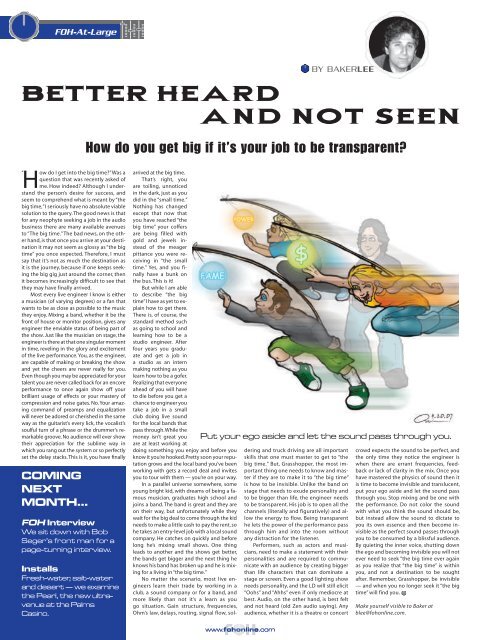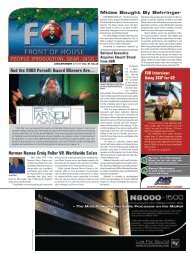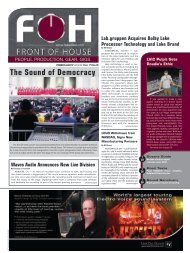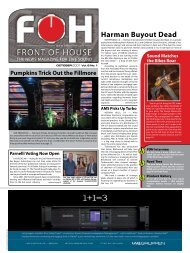May Issue - FOH Online
May Issue - FOH Online
May Issue - FOH Online
Create successful ePaper yourself
Turn your PDF publications into a flip-book with our unique Google optimized e-Paper software.
“ How do I get into the big time?” Was a<br />
question that was recently asked of<br />
me. How indeed? Although I understand<br />
the person’s desire for success, and<br />
seem to comprehend what is meant by “the<br />
big time,” I seriously have no absolute viable<br />
solution to the query. The good news is that<br />
for any neophyte seeking a job in the audio<br />
business there are many available avenues<br />
to “The big time.” The bad news, on the other<br />
hand, is that once you arrive at your destination<br />
it may not seem as glossy as “the big<br />
time” you once expected. Therefore, I must<br />
say that it’s not as much the destination as<br />
it is the journey, because if one keeps seeking<br />
the big gig just around the corner, then<br />
it becomes increasingly difficult to see that<br />
they may have finally arrived.<br />
Most every live engineer I know is either<br />
a musician (of varying degrees) or a fan that<br />
wants to be as close as possible to the music<br />
they enjoy. Mixing a band, whether it be the<br />
front of house or monitor position, gives any<br />
engineer the enviable status of being part of<br />
the show. Just like the musician on stage, the<br />
engineer is there at that one singular moment<br />
in time, reveling in the glory and excitement<br />
of the live performance. You, as the engineer,<br />
are capable of making or breaking the show<br />
and yet the cheers are never really for you.<br />
Even though you may be appreciated for your<br />
talent you are never called back for an encore<br />
performance to once again show off your<br />
brilliant usage of effects or your mastery of<br />
compression and noise gates. No. Your amazing<br />
command of preamps and equalization<br />
will never be adored or cherished in the same<br />
way as the guitarist’s every lick, the vocalist’s<br />
soulful turn of a phrase or the drummer’s remarkable<br />
groove. No audience will ever show<br />
their appreciation for the sublime way in<br />
which you rang out the system or so perfectly<br />
set the delay stacks. This is it, you have fi nally<br />
36<br />
<strong>FOH</strong>-At-Large<br />
Better Heard<br />
a n d N o t S e e n<br />
COMING<br />
NEXT<br />
MONTH...<br />
<strong>FOH</strong> Interview<br />
We sit down with Bob<br />
Seger’s front man for a<br />
page-turning interview.<br />
Installs<br />
Fresh-water, salt-water<br />
and desert — we examine<br />
the Pearl, the new ultravenue<br />
at the Palms<br />
Casino.<br />
MAY 2007<br />
How do you get big if it’s your job to be transparent?<br />
arrived at the big time.<br />
That’s right, you<br />
are toiling, unnoticed<br />
in the dark, just as you<br />
did in the “small time.”<br />
Nothing has changed<br />
except that now that<br />
you have reached “the<br />
big time” your coffers<br />
are being filled with<br />
gold and jewels instead<br />
of the meager<br />
pittance you were receiving<br />
in “the small<br />
time.” Yes, and you finally<br />
have a bunk on<br />
the bus. This is it!<br />
But while I am able<br />
to describe “the big<br />
time” I have as yet to explain<br />
how to get there.<br />
There is, of course, the<br />
standard method such<br />
as going to school and<br />
learning how to be a<br />
studio engineer. After<br />
four years you graduate<br />
and get a job in<br />
a studio as an intern<br />
making nothing as you<br />
learn how to be a gofer.<br />
Realizing that everyone<br />
ahead of you will have<br />
to die before you get a<br />
chance to engineer you<br />
take a job in a small<br />
club doing live sound<br />
for the local bands that<br />
pass through. While the<br />
money isn’t great you<br />
are at least working at<br />
doing something you enjoy and before you<br />
know it you’re hooked. Pretty soon your reputation<br />
grows and the local band you’ve been<br />
working with gets a record deal and invites<br />
you to tour with them — you’re on your way.<br />
In a parallel universe somewhere, some<br />
young bright kid, with dreams of being a famous<br />
musician, graduates high school and<br />
joins a band. The band is great and they are<br />
on their way, but unfortunately while they<br />
wait for the big deal to come through the kid<br />
needs to make a little cash to pay the rent, so<br />
he takes an entry-level job with a local sound<br />
company. He catches on quickly and before<br />
long he’s mixing small shows. One thing<br />
leads to another and the shows get better,<br />
the bands get bigger and the next thing he<br />
knows his band has broken up and he is mixing<br />
for a living in “the big time.”<br />
No matter the scenario, most live engineers<br />
learn their trade by working in a<br />
club, a sound company or for a band, and<br />
more likely than not it’s a learn as you<br />
go situation. Gain structure, frequencies,<br />
Ohm’s law, delays, routing, signal flow, sol-<br />
Put your ego aside and let the sound pass through you.<br />
www.fohonline.com<br />
BY BAKERLEE<br />
dering and truck driving are all important<br />
skills that one must master to get to “the<br />
big time.” But, Grasshopper, the most important<br />
thing one needs to know and master<br />
if they are to make it to “the big time”<br />
is how to be invisible. Unlike the band on<br />
stage that needs to exude personality and<br />
to be bigger than life, the engineer needs<br />
to be transparent. His job is to open all the<br />
channels (literally and figuratively) and allow<br />
the energy to flow. Being transparent<br />
he lets the power of the performance pass<br />
through him and into the room without<br />
any distraction for the listener.<br />
Performers, such as actors and musicians,<br />
need to make a statement with their<br />
personalities and are required to communicate<br />
with an audience by creating bigger<br />
than life characters that can dominate a<br />
stage or screen. Even a good lighting show<br />
needs personality, and the LD will still elicit<br />
“Oohs” and “Ahhs” even if only mediocre at<br />
best. Audio, on the other hand, is best felt<br />
and not heard (old Zen audio saying). Any<br />
audience, whether it is a theatre or concert<br />
crowd expects the sound to be perfect, and<br />
the only time they notice the engineer is<br />
when there are errant frequencies, feedback<br />
or lack of clarity in the mix. Once you<br />
have mastered the physics of sound then it<br />
is time to become invisible and translucent,<br />
put your ego aside and let the sound pass<br />
through you. Stop mixing and be one with<br />
the performance. Do not color the sound<br />
with what you think the sound should be,<br />
but instead allow the sound to dictate to<br />
you its own essence and then become invisible<br />
as the perfect sound passes through<br />
you to be consumed by a blissful audience.<br />
By quieting the inner voice, shutting down<br />
the ego and becoming invisible you will not<br />
ever need to seek “the big time ever again<br />
as you realize that “the big time” is within<br />
you, and not a destination to be sought<br />
after. Remember, Grasshopper, be invisible<br />
— and when you no longer seek it “the big<br />
time” will find you.<br />
Make yourself visible to Baker at<br />
blee@fohonline.com.

















